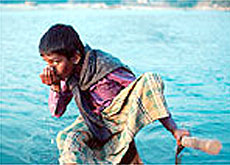Switzerland ranks 16th in world water survey

A new United Nations survey of how countries handle their water resources has put Switzerland high on the list for its efforts to stop industrial contamination.
But the report warned of a deepening global water crisis that could see up to seven billion people face severe shortages by 2050.
The UN’s cultural unit, Unesco, ranked Finland first, ahead of Canada, Britain and New Zealand in the index.
Belgium was considered worst on account of poor quality groundwater and heavy industrial pollution, behind Jordan, India and Morocco.
In the report, Unesco said the top-20 ranked countries had all demonstrated a commitment to improving their water supplies.
“The water quality in Switzerland is good, largely because of the availability of renewable water resources and its water treatment facilities,” Jean-Marie Barrat, a water expert at Unesco, told swissinfo.
Bruno Schädler, head of water management division at the Federal Office of Water and Geology, said the good result was thanks to concerted efforts in the past two decades to stop industrial waste from contaminating water.
“Some important industrial waste treatment plants have been built in the past 20 years, especially around Basel, which meant that the quality improved a lot,” Schädler told swissinfo.
He added that a national water action plan has also yielded good results in the Rhine, where salmon could once again be found.
Crisis
Published ahead of the World Water Forum in Kyoto, Japan, later this month, the Unesco survey said the global water crisis would reach unprecedented levels in the near future.
Population growth, pollution and global warming would combine to cut the average person’s water supply by a third in the next 20 years, it said.
The report, part of the UN’s International Year of Freshwater, also took aim at political leaders for failing to act and for sometimes even disputing the very existence of a water crisis.
“Attitude and behaviour problems lie at the heart of the crisis,” it said. “Inertia at leadership level, and a world population not fully aware of the scale of the problem means we fail to take the needed timely corrective actions.”
Summit
The Kyoto Forum, which kicks off on March 16, is the biggest political event of the UN International Year of Freshwater.
Philippe Roch, director of the Swiss Environment Agency and leader of the Swiss delegation to Kyoto, says the forum is a unique opportunity for the international community to discuss how to manage the Earth’s water supply.
“There is no United Nations organisation dealing with the overall question of water,” Roch told swissinfo. “This summit is the only chance to have a global view of water issues worldwide.”
Roch believes the forum can only be declared a success if delegates accept that the water-related topics of ecology and poverty are not mutually exclusive.
“My goal is to explain that there is no difference between development and environment, because the risk is that if money is only invested in building pipes and providing the poorest cities with water, then we forget the ecosystems,” Roch says.
swissinfo will be covering the Kyoto Forum and will have a special site dedicated to the UN International Year of Freshwater from April.
swissinfo, Vanessa Mock
About 20% of the world’s population does not have access to safe drinking water and 40% does not have adequate sanitation and hygiene.
In terms of water quality, the poorest country is Kuwait (10m3 per person per year); the richest is French Guiana (812,121m3).
Two million tons of waste is dumped into rivers, lakes and streams every day.
The Unesco report is billed as the most comprehensive evaluation of global water resources to date.
It comes ahead of the Third World Water Forum, which starts on March 16 in Kyoto, Japan.
Delegates from over 100 countries, including Switzerland, will attend the Forum.

In compliance with the JTI standards
More: SWI swissinfo.ch certified by the Journalism Trust Initiative
You can find an overview of ongoing debates with our journalists here. Please join us!
If you want to start a conversation about a topic raised in this article or want to report factual errors, email us at english@swissinfo.ch.